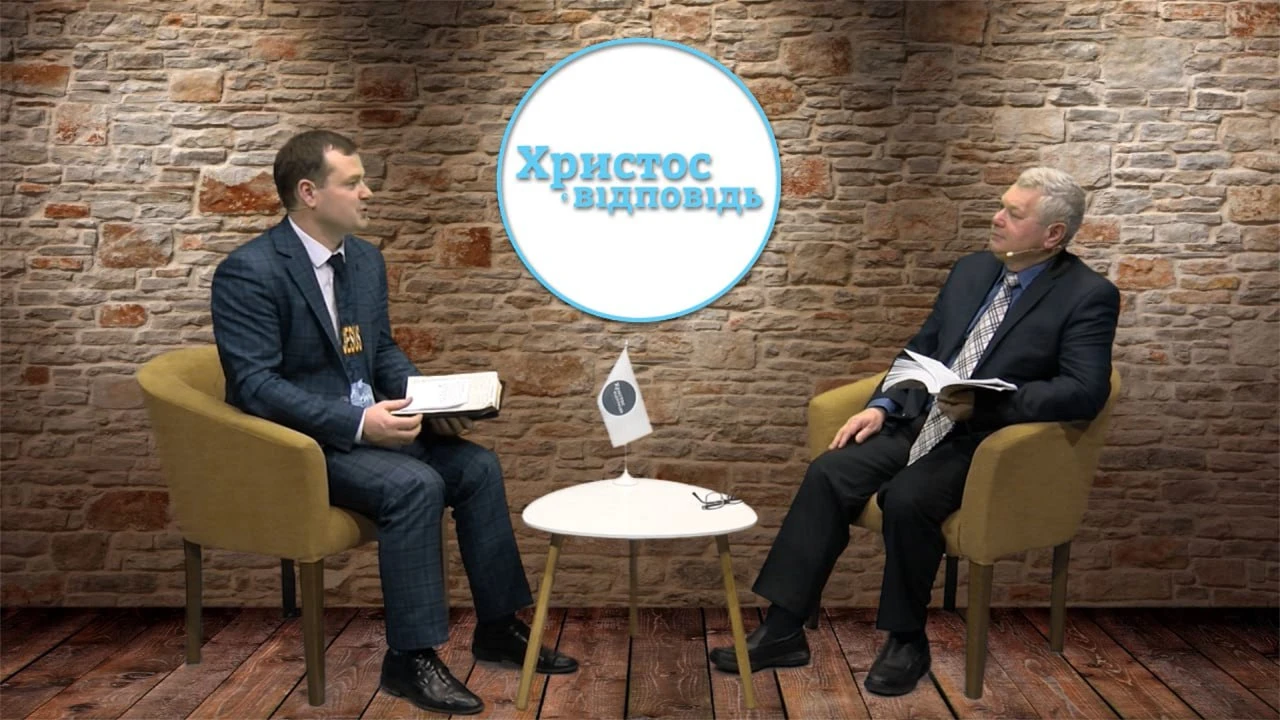“The Lord is keeping the door open for the Gospel through television even today”: Taras Sen, a preacher with 17 years’ experience of working with the media
9 April 2024
The importance of preachers being featured on secular television, how to get there and the challenges they face as they move from the pulpit to the high stage of the media to preach the Gospel. Taras Sen, director of the Christ is the Answer ministry and pastor of the church of the same name in Rivne, shared his insights in an interview.
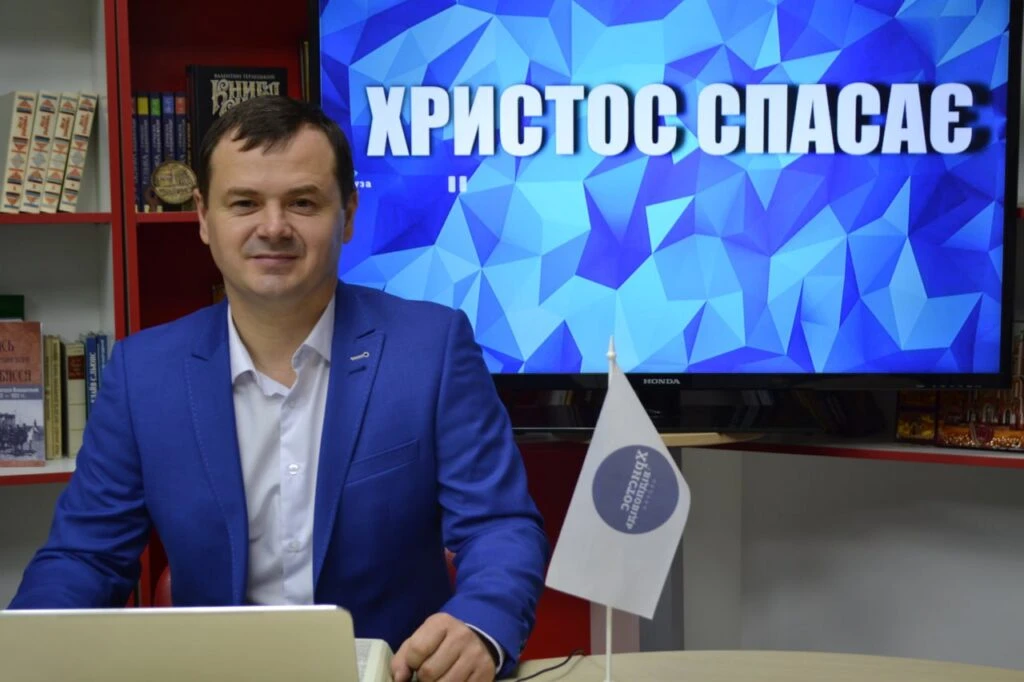
How important is the presence of the Church in the person of a preacher (pastor, minister) in the media, particularly on TV?
In Soviet times, the Church was positioned as being outside of society and of secondary importance. Many people in the churches still live with this mindset today.
When Christians, especially pastors, are present in the media, it shows that the church is equal to all other institutions. Pastors and preachers use the media to remind us of Christ, and it is an opportunity to speak God’s Word to the public.
You have been leading a church in Rivne for 8 years. What trends do you observe among your colleagues, pastors, regarding the integration of the church into the media in your region?
When I started working in Rivne, God immediately opened the door to the media. I went to the TV station and arranged a time. Then editors from a local magazine found me and offered me cooperation. I began to reach out to local newspapers myself.
Then my program appeared on another TV channel. Today, author radio programs have been added.
At the beginning of my ministry in Rivne, there were several preachers on local television. Before the last elections, the programs of Protestant preachers, including a bishop who had been preaching on the channel for 15 years, were closed because they did not fit the concept. It was a miracle that I was left to host the program on local TV.
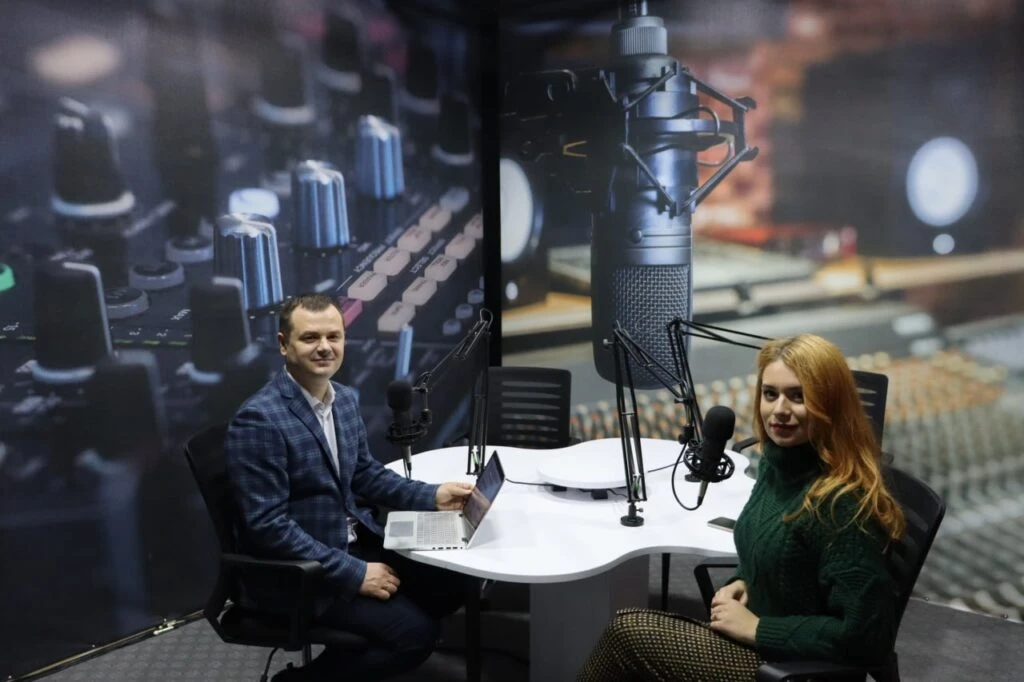
Last year, a radio station opened in Rivne, and the director, a former director of a TV channel, called me and asked me to start a program there.
I refused for a long time because I had many other things to do. At the same time, I asked the pastors of Rivne if any of them would like to go on the radio to preach.
No one took the lead, so I decided to record the programs myself. By the way, I have already recorded thirty-nine episodes.
That is, there is passivity on the part of the church in relation to the media. At most, let’s say, the church works with the media through its own publications, its own newspaper, its own YouTube channel, etc. This is good, but secular people are not often interested in Christian media.
When you served in the Luhansk region, you actively engaged the regional media in cooperation. Was that your first experience? Could you tell us how you began to work with TV channels at that time?
I remember walking through the city and seeing a TV channel. I thought it would be great if Christian programs were broadcast on secular TV channels. I wrote to the ministers about cooperation, but received no response. But my heart was burning with this.
And one day I was praying at home and I realized that God wanted me to start this ministry – to work with TV.
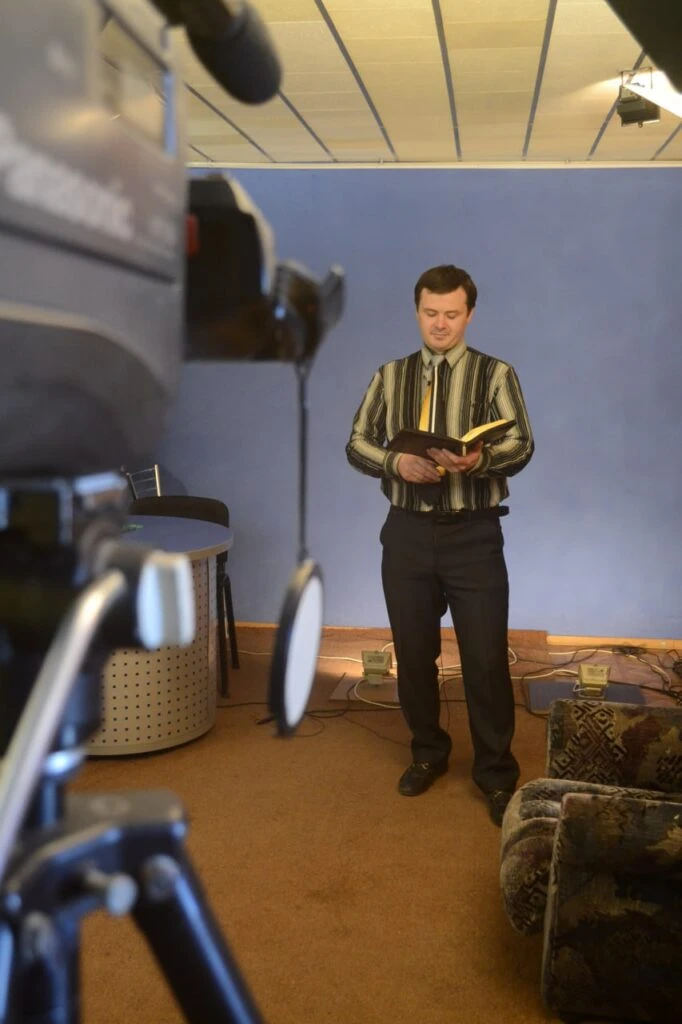
For me, for example, it was hard to break myself. For me, television was something out of reach. But I took action: I went to a TV station and found out the costs. And I had no experience, no cameras, no money: I had nothing. But God helped me to find the money.
So I began to record programs, first in the Luhansk region, and now in other regions. I believe and have seen that God’s hand was simply with me in this matter.
Firstly, God helped me to take a step in this direction. Secondly, there were many revolts. For example, the main Orthodox priest in the city of Sverdlovsk, where I started, went to the mayor of the city and pressured him to get me fired from television. He put pressure on the director of the TV station… there was a lot of fuss.
Atheists raised their voices and said, “What is this? Sects are allowed on television?”. But the Lord opened the door. This went on for nine years until the separatists came to town.
Tell me, is paying for airtime a prerequisite for getting on TV? What are the other requirements?
Regional TV stations are interested in finances, of course. But a TV station can’t let just anybody come on, because they are concerned about their image.
I can’t say that I’m a great speaker, but I have a theological education. I graduated from the Biblical Institute, then studied at the Ostroh Academy, specializing in religious studies, and worked on my preaching skills. I learned as much as I could to speak on camera. There is always psychological stress when you are in front of the camera, but you have to work on yourself as much as you can.
A lot of people don’t want to go to the media because they don’t have the experience and they’re afraid. But you have to get over yourself. Many people limit themselves to preaching in church because it is much easier to preach there than in front of a camera. And there are just a lot of lazy people.
Not everyone wants to see and not everyone sees the fulfillment of Christ’s Great Commission to go into the world, not to lock themselves up in the church and preach to each other. And it’s good to preach on the street, but television is a higher level.
For example, in Rivne, God opened the door for me to the main TV channel, which is the highest stage in the Rivne region. So I was able to reach people a hundred kilometers away in many villages. And I heard many testimonies of people coming to faith, repenting in the church, and some starting to read the Bible.
I heard from the pastors that people came to their churches who had been listening to TV programs for a long time. I remember that in Rivne a TV channel aired my program three or four times a week because time was cheap. I paid only $60-70 a month, almost free.
Then I offered other pastors to go to that TV station. No one wanted to.
In churches where there are more than ten preachers, people line up to preach from the pulpit… But going to the people? No one wanted to. Sadly, this is the truth.
How can a pastor (minister) with no experience start working with local media? Give recommendations for newcomers in this field.
I would advise first of all to pray, to seek God, so that you can understand from Him what the Lord is sending you there.
On the other hand, do not go to the extreme of waiting for an angel to appear from the sky. Sometimes you will see an open door, good people will appear on the way – take action. God speaks in different ways. But if we are sincere before Him and willing to take steps of faith, to work on ourselves, God will give us the understanding to move in one direction or another.
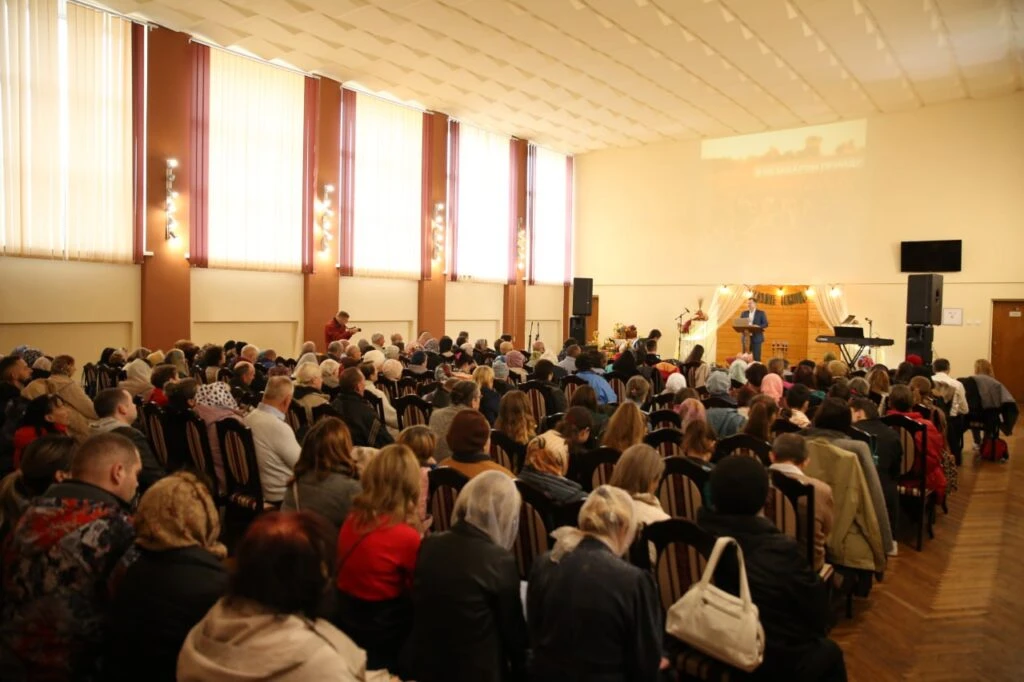
I think it is a great shortcoming of the churches that they do not pray for the media. For years we have been praying for the media in Rivne, for the media in Ukraine, listing their names in prayer meetings. We pray for the owners, the journalists, the anchors. This needs to be revived in the churches. Time will pass and the Lord will change the situation and through prayer the doors will be opened for the preaching of the Gospel.
First of all, we need to pray for the media workers because they are ordinary people for whom Christ died. They need salvation. And secondly, they are the ones who, together with the educational institutions, shape the opinions of society.
Therefore, those who want to go into the media must pray, seek God’s face, so that God will go ahead and open the door, because it is not so easy.
Second, you have to develop your professional skills, study, get an education, work on your speech, take courses.
Naturally, silver is it. The media does not always have money and they want to be paid.
There is no need to wait for someone to come to your house and film you. It should be our interest and initiative: we go to the media and offer our services.
Next, it is important to speak in a language that secular people can understand, not church language. We should raise issues that are relevant to society, so that there is a response to the problems. But the center of our speeches should be the Gospel. Because sometimes, as I have observed, Christians run programs that are more social than spiritual.
Of course, there may be different programs, but I understand what society needs and am motivated by God. So no matter what I preach, I always say “Christ”, “salvation”, “faith”, “eternal life” – how to get it? That is, the main points from the Word of God.
And of course it is important to build relationships with media people. For example, June 6th is Journalists’ Day. I bought a cake and went and congratulated them. Easter, Christmas – I congratulated them. And by the way, a few years ago in Rivne a TV channel congratulated me on my birthday on TV and played Christian songs. Interestingly, the mayor and the deputies are not greeted in this way. Why did they do that? Because I also congratulated them in a program upon request.

It is also good if a church holds some kind of charity event, perhaps a children’s camp, help for displaced persons, and invites the secular media. We have done this many times.
Sometimes they go, sometimes I pay or bring a film crew myself. But the media gets the information, secular people see the news about what the church is doing.
And when they are shown on TV, many people think that they are not a cult, but normal people.
For example, in the Luhansk region we held a children’s camp, and I arranged for television to come. They filmed and showed it. It was a shock for the people of the region, because no one had ever held a free children’s camp there before.
Before that story, when I went to educational institutions and asked to speak, they would let me in, but they looked down on me.
And after I started hosting programs on television and the news saw what we were doing, the attitude in the educational institution changed for the better.
Today, as a pastor, you preach on several local TV channels in different regions. Could you tell us which ones and what kind of programs you broadcast?
Right now I have a program on TVi. This is the finest TV channel in Rivne. We send the same programs to the Ternopil regional channel, Ternopil 1, and to two channels in the Khmelnytsky region (Channel 33 and TV7+).
We are translating the same programs into Mongolian, and in Mongolia they are being shown on the national channel for the second year.
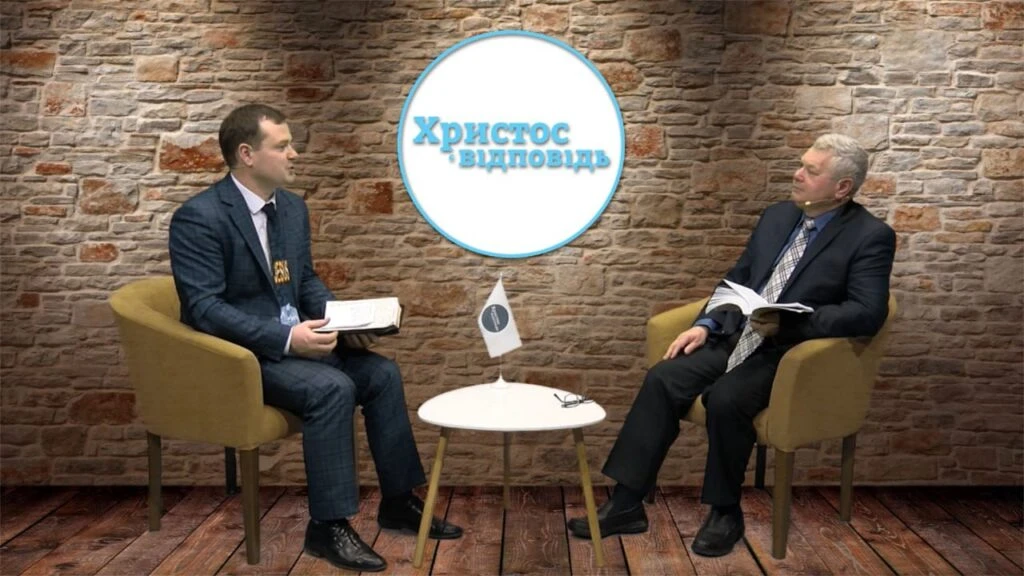
I used to work for the Rivne 1 TV channel and hosted two programs, “What Does the Bible Say?” and “Christ is the Answer,” to which I invited other guests.
Now my program is called “Good News” on iTV. The owner of the Rivne 1 channel changed and I was denied a program.
But the iTV channel is quite powerful, with many good employees. And in a way it’s a little easier for me, because when you have been hosting different programs for years, it’s hard work, because I have many other tasks besides television.
Do you know the ratings of your programs? To what extent is the Ukrainian population interested in such programs?
I don’t have any information about the percentage of the population watching. I asked the TV channels and they said that it is possible to count, but complicated.
Yet journalists from secular channels themselves told me that the vast majority of Rivne residents know me, because many people have been watching my programs for the past 8 years.
I heard many testimonies that after these programs people came to God and started reading the Bible.
Some people can’t read or are handicapped and sit at home waiting for the program. I have heard many such testimonies. And even the fact that people recognize me all over Rivne when they meet me by chance.
Today, four regional channels in Ukraine and Mongolia broadcast more than 60 programs a month (with repeats). And there was a time when 100 TV programs a month were broadcast on different channels.
Before Russia’s full-scale invasion of Ukraine, programs in the Luhansk region were broadcast on the IRTA TV channel. And in Rivne there was a time when I had three television programs on two channels, at least one or even two programs aired every day, so we filled the society with the Word of God through television.
In total, I worked with 12 channels in Ukraine and one in Mongolia, as well as TV channels in Ethiopia.
As we all know, television time is not free. How realistic is it for pastors to be on television when the church budget does not always allow it?
I believe that if you want to and with God’s help, you can. When I was a student and had to go on a mission after the Bible Institute, God told me through the Holy Spirit to go. The Bible says that God gives seed to the one who sows.
The one who sows is the one who has a vision. If you take a farmer, he sees two hectares of land and plans to sow it with grain. God gives a man with a vision everything he needs.
But I often see pastors who say they don’t do things because they don’t have enough money, and it’s true. I have done many things in my life, and like others, I had no money, no helpers, no experience. But I had a desire.
There were times when I was even in debt to TV stations to continue the programs. God allowed those moments and watched how I would behave. But I had a great desire and I prayed for it.
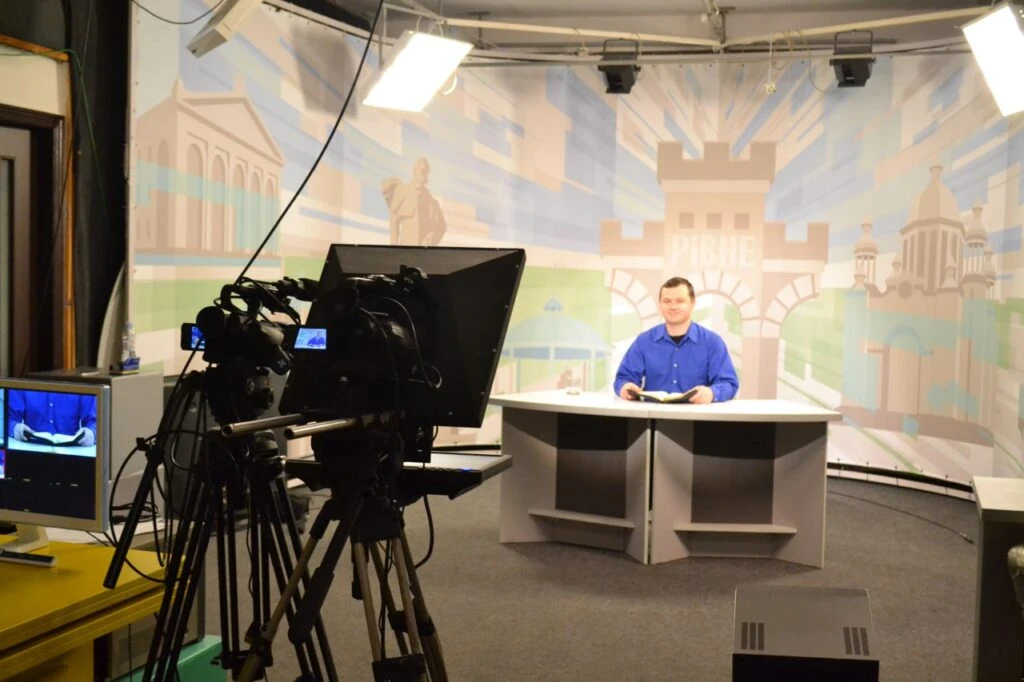
How much does it cost to broadcast? It varies, depending on the TV station: district, regional or national. Secondly, it depends on what time the programs are aired: prime time or other time slots. All this has a significant impact on the price. But in my case (I have been doing this for many years), I have seen the grace of God, that God has touched people’s hearts.
For example, how did the cooperation with the TV channel in Rivne begin? It was about a month and a half after we started the church, and during one of the morning prayers with the team, I felt in my spirit that God wanted me to work with television. I asked a friend about the TV stations in the city, found their phone numbers on the Internet, and set up a meeting. On the way to the meeting, I prayed: “Lord, be on my lips, let me say the words that will work.”
I told them that I was from the Rivne region, that I had served for many years in Donbas, where I worked with the local television, and that I had been a prisoner of war.
They considered me a hero and let me work at the TV station for a pittance when they heard that I had been a POW. I was surprised myself.
I had no money, no camera, no studio, no cameramen. I recorded programs with them and they helped me make a screen saver.
It was also difficult for me to speak Ukrainian, because I used to speak Russian when I preached in Donbas, and I tried to adapt, and with God’s help I succeeded.
So the main thing is the will of the pastor himself?
Will, first of all, and then effort. And of course, to move with God, to feel where the Lord God is leading. For those who do this sincerely, God gives them a sense of how to move. Sometimes you have to act on the principle of open/closed doors. The Bible also says that God gives wisdom.
Sometimes I had situations where I didn’t know what to do, what to say, or where to go. Like a little child, I prayed and asked God for wisdom. Then I understood how and what to do.
If you rely on God and seek Him, He will give you the answer. And if you rely on your mind alone, without God, you can run into a closed door and there will be no further movement.
By the way, I want to say this: All the time (seventeen years) that I’ve been preaching on television, in addition to just preaching, talking about faith, repentance, eternal life, hell, salvation, I’ve prayed on the air more than once and asked who would like to pray the prayer of repentance with me.
I understand that among the viewers there are many atheists, other people who do not like it, but the Lord keeps the door open for the Gospel through television even today.
And you can imagine: in some village a person is drinking coffee, turns on the television in the evening and hears: “If you want to be saved…Christ, faith, repentance…pray.” A person can be saved.
I know that you have taken a class in hosting at one of the secular TV channels. To what extent are the broadcasters open to training preachers?
That is how they make money, first of all. And secondly, they identify capable people to invite to their channel. Anyone can pay money for courses and study. They don’t ask whether you are a preacher or not. There are many courses and they are very affordable.
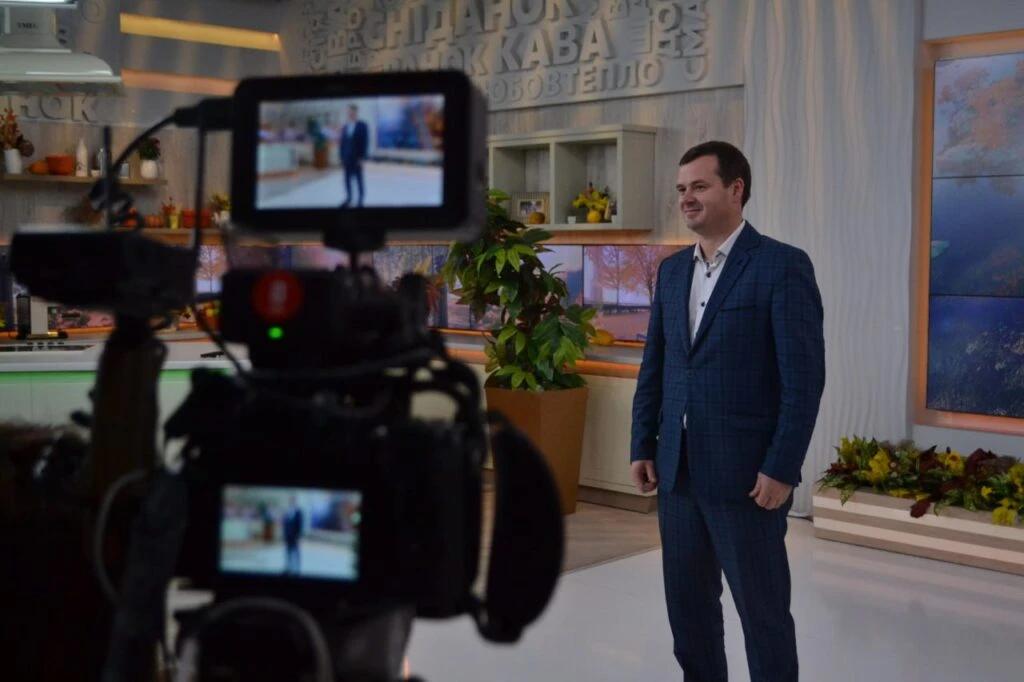
The course I took called “The Work of a Presenter in the Frame,” but there are more classes.
In these classes, they asked you to tell us a little bit about yourself, about the reason for studying. I told them that I am a preacher on television, but came there to improve my skills. I believe that people need the Word of God to heal families, souls and lives.
Nobody objected because everyone understood that this was the way it should be. There is not enough pure and Godly in the secular media, and many people need God.
How easy or difficult is it to cooperate with secular TV channels, since they usually do not talk about the Gospel?
I am accustomed to doing it all through prayer and seeking God. I start to act when I feel that He is leading me in a certain direction. And then I have success. I look to see if the door is open somewhere. If not, I know that others will be opened.
For example, in Rivne I started hosting a program, and a few months later I went to the Zhytomyr regional channel, and then to the Khmelnytsky regional channel.
For two years I preached on a TV channel in the Zhytomyr region. You can go further, there are many different TV channels in Ukraine, but it takes time and money.
If I had only done that, we would have made more progress with the TV channels, but there are many other good ministries.
I would like to reiterate the importance of the Church’s presence in the secular media. This is possible even when the doors are closed. We must remember the words of Christ. He said that when he opens a door, no one will close it. Therefore, if the door is closed, we should fast and pray that the Lord will open it to proclaim the Gospel, and the Lord will do His work.
Thank you for the interview.
Press Center of Christ is the Answer Ministry.
